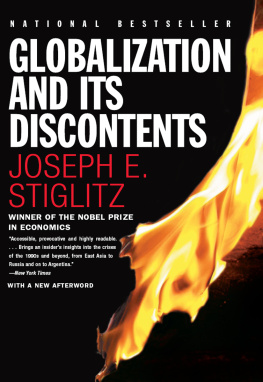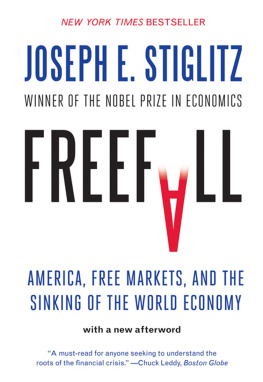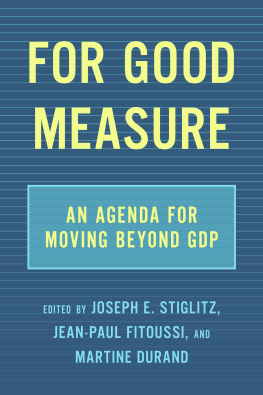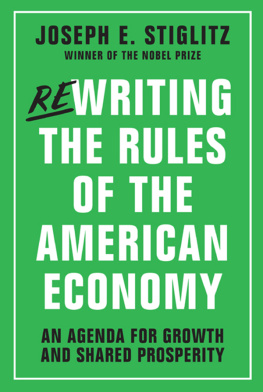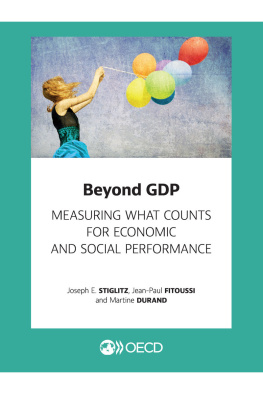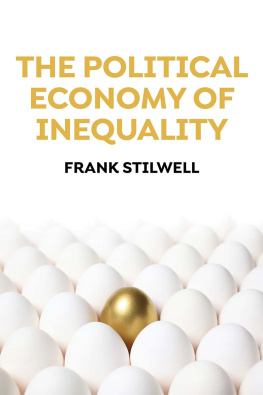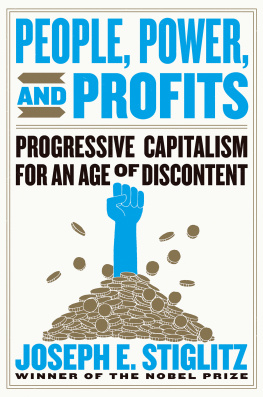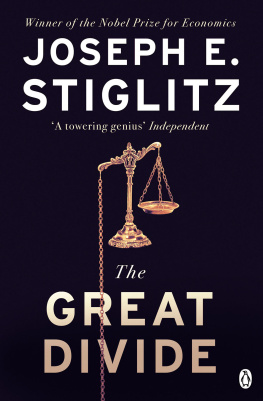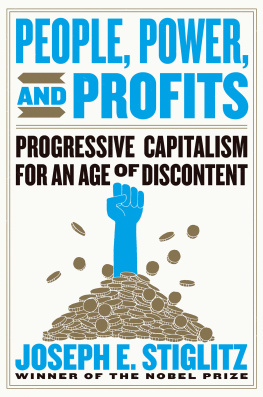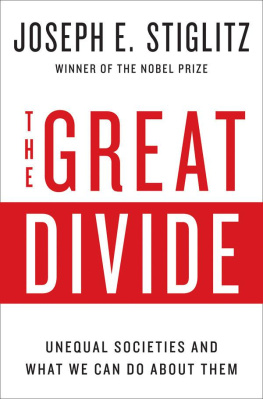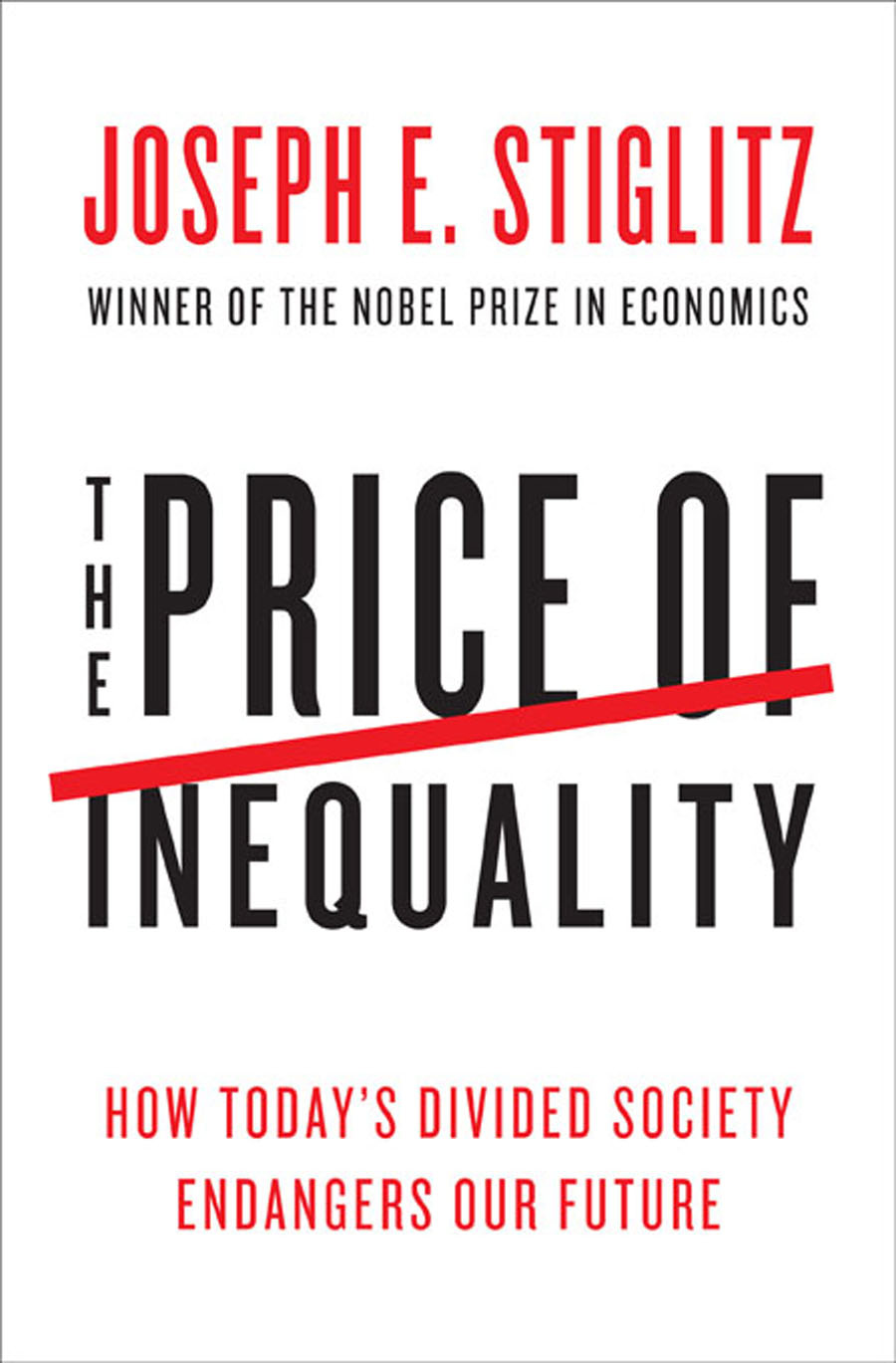
A LSO BY J OSEPH E. S TIGLITZ
Freefall: America, Free Markets,
and the Sinking of the World Economy
The Three Trillion Dollar War:
The True Cost of the Iraq Conflict
(with Linda J. Bilmes)
Making Globalization Work
The Roaring Nineties
Globalization and Its Discontents

THE PRICE OF
INEQUALITY

J OSEPH E. S TIGLITZ

W. W. N ORTON & C OMPANY
N EW Y ORK L ONDON
To Siobhan and Michael and Edward and Julia,
In the hopes that they will inherit
a world and a country that are less divided
C ONTENTS

P REFACE

T HERE ARE MOMENTS IN HISTORY WHEN PEOPLE ALL over the world seem to rise up, to say that something is wrong , to ask for change. This is what happened in the tumultuous years 1848 and 1968. Each of these years of upheaval marked the beginning of a new era. The year 2011 may prove to be another such moment.
A youth uprising that began in Tunisia, a little country on the coast of North Africa, spread to nearby Egypt, then to other countries of the Middle East. In some cases, the spark of protest seemed at least temporarily doused. In others, though, small protests precipitated cataclysmic societal change, taking down long-established dictators such as Egypts Hosni Mubarak and Libyas Muammar Qaddafi. Soon the people of Spain and Greece, the United Kingdom, and the United States, and other countries around the world, had their own reasons to be in the streets.
Throughout 2011, I gladly accepted invitations to Egypt, Spain, and Tunisia and met with protesters in Madrids Buen Retiro Park, at Zuccotti Park in New York, and in Cairo, where I spoke with young men and women who had been at Tahrir Square.
As we talked, it was clear to me that while specific grievances varied from country to country and, in particular, that the political grievances in the Middle East were very different from those in the West, there were some shared themes. There was a common understanding that in many ways the economic and political system had failed and that both were fundamentally unfair.
The protesters were right that something was wrong. The gap between what our economic and political systems are supposed to dowhat we were told they did doand what they actually do became too large to be ignored. Governments around the world were not addressing key economic problems, including that of persistent unemployment; and as universal values of fairness became sacrificed to the greed of a few, in spite of rhetoric to the contrary, the feeling of unfairness became a feeling of betrayal.
That the young would rise up against the dictatorships of Tunisia and Egypt was understandable. The youth were tired of aging, sclerotic leaders who protected their own interests at the expense of the rest of society. They had no opportunities to call for change through democratic processes. But electoral politics had also failed in Western democracies. U.S. president Barack Obama had promised change you can believe in, but he subsequently delivered economic policies that, to many Americans, seemed like more of the same.
And yet in the United States and elsewhere, there were signs of hope in these youthful protesters, joined by their parents, grandparents, and teachers. They were not revolutionaries or anarchists. They were not trying to overthrow the system. They still believed that the electoral process might work, if only governments remembered that they are accountable to the people. The protesters took to the streets in order to push the system to change.
The name chosen by the young Spanish protesters in their movement that began on May 15 was los indignados, the indignant or outraged. They were outraged that so many would suffer so muchexemplified by a youth unemployment rate in excess of 40 percent since the beginning of the crisis in 2008as a result of the misdeeds of those in the financial sector. In the United States the Occupy Wall Street movement echoed the same refrain. The unfairness of a situation in which so many lost their homes and their jobs while the bankers enjoyed large bonuses was grating.
But the U.S. protests soon went beyond a focus on Wall Street to the broader inequities in American society. Their slogan became the 99 percent. The protesters who took this slogan echoed the title of an article I wrote for the magazine Vanity Fair , Of the 1%, for the 1%, by the 1%,
Three themes resonated around the world: that markets werent working the way they were supposed to, for they were obviously neither efficient nor stable; that the political system hadnt corrected the market failures; and that the economic and political systems are fundamentally unfair. While this book focuses on the excessive inequality that marks the United States and some other advanced industrial countries today, it explains how the three themes are intimately interlinked: the inequality is cause and consequence of the failure of the political system, and it contributes to the instability of our economic system, which in turn contributes to increased inequalitya vicious downward spiral into which we have descended, and from which we can emerge only through concerted policies that I describe below.
Before centering our attention on inequality, I want to set the scene, by describing the broader failures of our economic system.
The failure of markets
Markets have clearly not been working in the way that their boosters claim. Markets are supposed to be stable, but the global financial crisis showed that they could be very unstable, with devastating consequences. The bankers had taken bets that, without government assistance, would have brought them and the entire economy down. But a closer look at the system showed that this was not an accident; the bankers had incentives to behave this way.
The virtue of the market is supposed to be its efficiency. But the market obviously is not efficient. The most basic law of economicsnecessary if the economy is to be efficientis that demand equals supply. But we have a world in which there are huge unmet needsinvestments to bring the poor out of poverty, to promote development in less developed countries in Africa and other continents around the world, to retrofit the global economy to face the challenges of global warming. At the same time, we have vast underutilized resourcesworkers and machines that are idle or are not producing up to their potential. Unemploymentthe inability of the market to generate jobs for so many citizensis the worst failure of the market, the greatest source of inefficiency, and a major cause of inequality.
As of March 2012, some 24 million Americans who would have liked a full-time job couldnt get one.
In the United States, we are throwing millions out of their homes. We have empty homes and homeless people.
But even before the crisis, the American economy had not been delivering what had been promised: although there was growth in GDP, most citizens were seeing their standards of living erode . As chapter 1 shows, for most American families, even before the onset of recession, incomes adjusted for inflation were lower than they had been a decade earlier. America had created a marvelous economic machine, but evidently one that worked only for those at the top.
Next page

